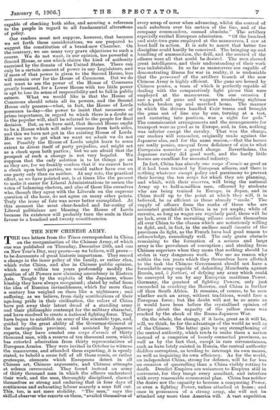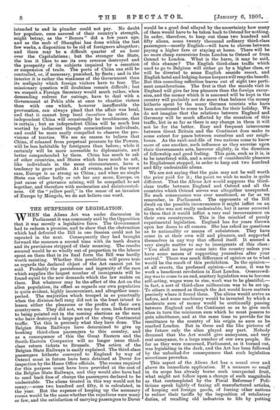THE NEW CHINESE ARMY. T HE two letters from the Times
correspondent in China on the reorganisation of the Chinese Army, of which one was published on Thursday, December 28th, and one on New Year's Day, may prove—as we believe, will prove — to be documents of great historic importance. They record a change in the inner policy of the family, or rather clan, which rules China, and also in Chinese public opinion, which may within ten years profoundly modify the position of all Powers now claiming ascendency in Eastern Asia. Taught by the exploits of the Japanese, whose kinship they have always recognised ; elated by relief from the idea of Russian invincibleness, which for more than a century has weighed on them like a nightmare ; and suffering, as we believe, from daily scarifications of their age-long pride in their civilisation, the rulers of China have put away their latent dread of a standing army and their philosophic contempt for the military character, and have resolved to create a, national fighting force. They have begun to establish an army of the scientific type, and, guided by the great ability of the Governor-General of the metropolitan province, and assisted by Japanese experts, they have created one corps d'aringe of thirty thousand men, with a reserve of ten thousand more, which has extorted admiration from thirty representatives of European Armies. They were invited in October to witness the mauceuvres, and attended them expecting, it is openly stated, to behold a scene full of all those comic, or rather grotesque, elements which Europeans detect in all Chinese art, Chinese arguments, and Chinese attempts at solemn ceremonial. They found instead an army of thirty thousand men in which the officers understood their work, and the men, thoroughly disciplined, showed themselves so strong and enduring that in four days of continuous and exhausting labour scarcely a man fell out.. This, too, is not mere stolidity. "The men," says the skillad observer who reports on them, "availed themselves of every scrap of cover when advancing, whilst the control of each subaltern over his section of the line, and of the company commanders, seemed absolute." The artillery especially excited European admiration. 'Of the hundred and sixty-two guns employed at the manceuvres, I saw at least half in action. It is safe to assert that better fire discipline could hardly be conceived. The bringing up and handling of ammunition, the drill, and the control of the officers were all that could be desired. The men showed great intelligence, and their understanding of their work was indubitable. In so far as manceuvres are capable of demonstrating fitness for war in reality, it is undeniable that the personnel of the artillery branch of the new Chinese Army is highly efficient. The guns are horsed by Chinese ponies, a team of which is perfectly capable of dealing with the comparatively light pieces that were employed at the manceuvres. On one occasion I saw a park of guns and waggons numbering eighteen vehicles broken up and marched home. The manner in which the drivers handled their teams and brought the guns out of line one by one, turning at a trot, and cantering into position, was a sight for gods." The commissariat arrangements and the arrangements for transport were as good as in Europe, and, in fine, nothing was inferior except the cavalry. That was the charge, our readers will remember, originally made against the Japanese also, and for the same reason,—that the horses are really ponies, unequal from deficiency of size to what Europeans consider a grand charge. Nevertheless, the Japanese cavalry did good work, and the hardy little horses are excellent for mounted infantry.
In fact, China has already one corps d'armee as good as if it had been trained by European officers, and there is nothing whatever except policy and parsimony to prevent their having the ten corps for which they are planning, and which, with their reserves, will bring the national Army up to half-a-million men, officered by students who are being trained in Europe, in Japan, and in China itself up to the point at which they will, it is believed, be as efficient as those already "made." The supply of officers from the ranks of those who are accounted gentlefolk in China is as yet ample ; while of recruits, so long as wages are regularly paid, there will be no lack, even if the recruiting officers confine themselves all over China to the classes which are notoriously willing to fight, and, in fact, in the endless small jmeutes of the provinces do fight, as the French have had good reason to acknowledge, exceedingly well. The only grave obstacle remaining to the formation of a serious and large army is the prevalence of corruption ; and stealing from Chinese superiors when they mean that nothing should be stolen is very dangerous work. We see no reason why within the ten years which they themselves have allotted to the task the Chinese Government should not have a. formidable army capable of defending Manchuria against Russia, and, a fortiori, of defying any army which could be conveyed by sea by any European maritime Power. Germany, the greatest of fighting Powers, only just succeeded in crushing the Hereros, and China is further off than South Africa. It remains, of course, to be seen whether such an army, without traditions, would face a European force ; but the doubt will not be so acute as it would have been before the crystallised opinion of Europe about the capacity of the yellow races was cracked by the shock of the Russo-Japanese War.
On the whole, the change, if it lasts, great as it will be, will, we think, be for the advantage of the world as well as of the Chinese. The latter gain by any strengthening of the central authority, which tends to make them a nation instead of a congeries of loosely connected provinces, as well as by the fact that, except in rare circumstances, such as have lately existed in Russia, the central authority dislikes corruption, as tending to intercept its own means, as well as impairing its own efficiency. As for the world, an independent China, strong for defence, will be far less an occasion of quarrelling than a China visibly rotting to death. Derelict Empires are nuisances to Empires still in movement, for they tempt every assailant, and interfere with every reasonable commercial plan. China has neither the desire nor the capacity to become a conquering Power, or even a fighting Power, unless attacked at home ; and once in possession of a strong army, she will not be attacked any more than America will. A vast expedition intended to end in plunder could not pay. No doubt her populace, once assured, of their country's strength, might betray, as the " Boxers " did a few years ago, and as the mob of Shanghai has done within the last few weeks, a disposition to be rid of foreigners altogether; and there may be a difficult quarter of an hour over the Capitulations ; but the stronger the State, the less it likes to see its own revenue destroyed and the prosperity of its subjects impaired by a cessation or suspension of trade. The ports of China can still be controlled, or, if necessary, punished, by fleets ; and in the interior it is rather the weakness of the Government than its malignity which foreign visitors have to fear. The missionary question will doubtless remain difficult ; but we suspect a, Foreign Secretary would much rather, when demanding redress for outrage, have to deal with a Government at Pekin able at once to chastise rioters than with one which, however insufferable the provocation, can always plead that the affair was local, and that it cannot keep local imeutiers in order. An independent China will occasionally be troublesome, that is certain ; but an independent China will be much less worried by indiscreet though conscientious individuals, and, could be more easily compelled to observe the pro- visions of treaties. We see no reason to believe that China, if released from perpetual pressure by the Powers, will be less habitable by foreigners than before ; while it certainly will be more accessible to diplomatists, and better comprehended by them. China has much to ask of other countries, and States which have much to ask, like individuals in the same circumstances, have a tendency to grow polite. At all events, and in the worst case, Europe is as strong as China ; and when no single State can either bully or rob her any more, Europe, on just cause of grievance arising, will be compelled to act together, and therefore with moderation and disinterested- ness. Of the "yellow peril," in the sense, of an invasion of Europe by Mongols, we do not believe one word.



















































 Previous page
Previous page